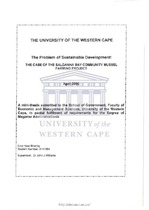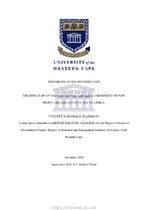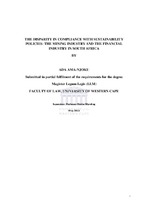| dc.contributor.advisor | Williams, John | |
| dc.contributor.author | Brierley, Errol Noel | |
| dc.date.accessioned | 2020-08-26T10:58:50Z | |
| dc.date.available | 2020-08-26T10:58:50Z | |
| dc.date.issued | 2003 | |
| dc.identifier.uri | http://hdl.handle.net/11394/7318 | |
| dc.description | Magister Administrationis - MAdmin | en_US |
| dc.description.abstract | Existing literature offers various definitions of sustainable
development, yet very few efforts have thus far been made to move
specific communities to such a state of development. Popularised by
the Brundland report, the concept of sustainable development is
understood to be that which "meets the needs of the present without
compromising the ability of the future generations to meet their own
needs". However, the abstract concept of sustainable development
raises various of questions concerning, for example, intergenerational
implications of patterns of resources use and equitable
resource allocations as highlighted in this study.
This research indicates that the principles of sustainable development
posed a veritable challenge to development projects. Hence, the
confusion surrounding the concept, often leads to disagreement and
misunderstanding in the demarcation of specific projects. | en_US |
| dc.language.iso | en | en_US |
| dc.publisher | University of the Western Cape | en_US |
| dc.subject | Sustainable development | en_US |
| dc.subject | Sustainability | en_US |
| dc.subject | Sustainable projects | en_US |
| dc.subject | Sustainable use of resources | en_US |
| dc.subject | Economic | en_US |
| dc.subject | Ecological sustainable communities | en_US |
| dc.subject | Social | en_US |
| dc.title | The Problem of Sustainable Development: The case of the Saldanha Bay community mussel farming project | en_US |
| dc.rights.holder | University of the Western Cape | en_US |




